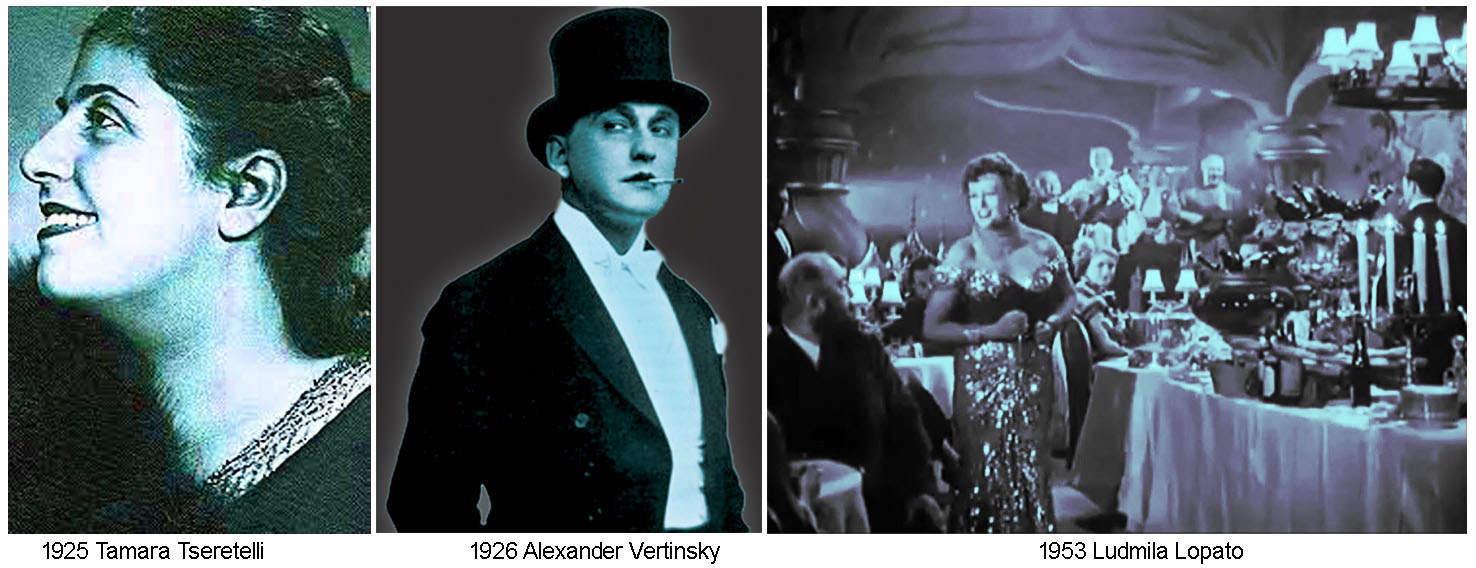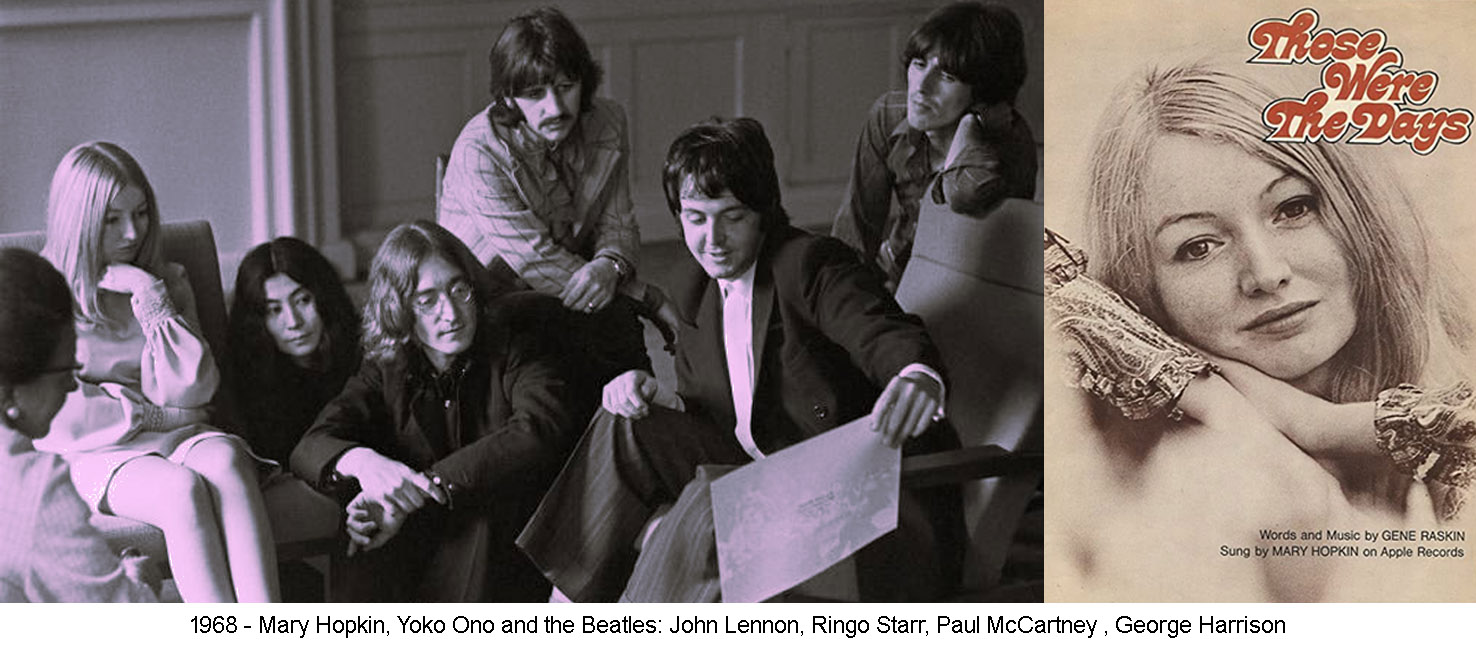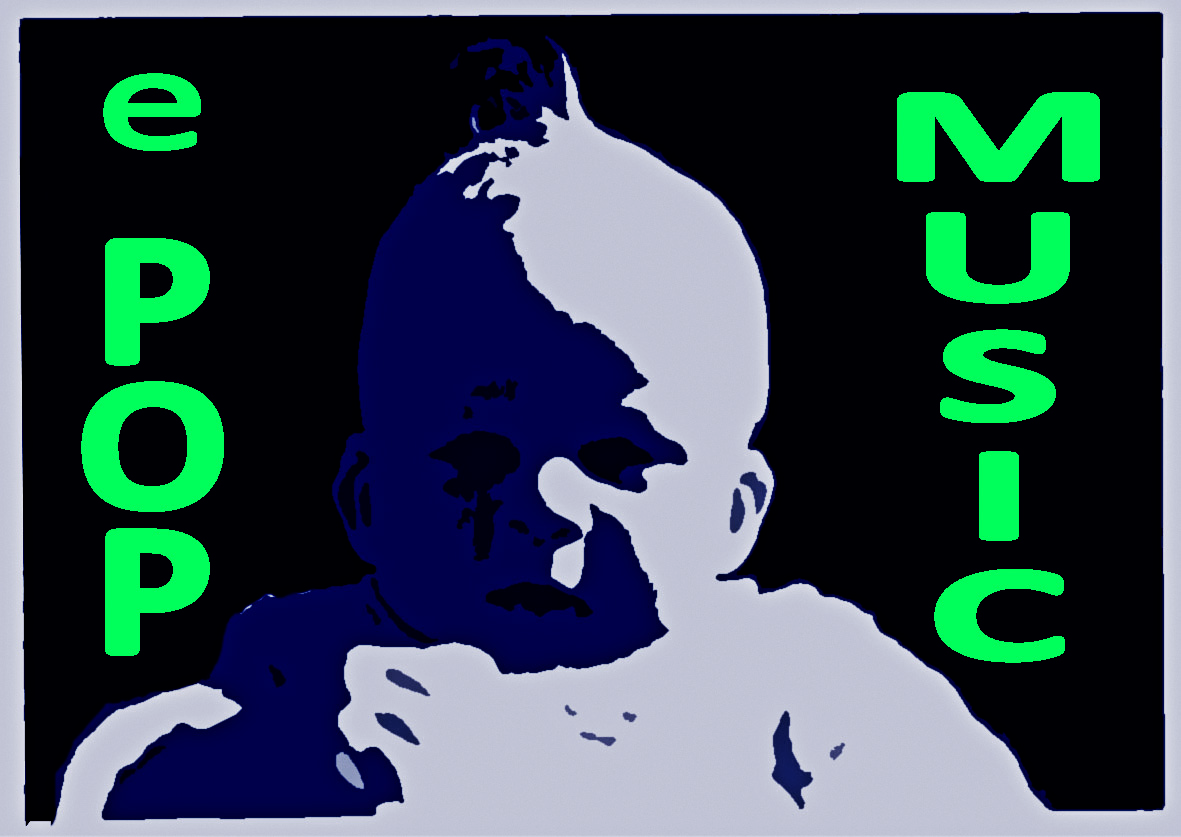Those were the days
FOLK ∙ America ∙ UK ∙ Europe ∙ Latin America ∙ Africa ∙ Russia ∙
JOURNEY THROUGH 400 FOLK SONGS
10 peculiar folk themes from the 60s
When he delivers a song that later becomes popular, the singer-songwriter is just its creator and first performer. He has no control over how others will fix it and the song's later life is quite another story. The secondary fate experienced by each of the ten folk themes below is instructive in this regard:
- 1957 ∙ La foule (Edith Piaf Fr)
- 1960 ∙ Where have all the flowers gone (Pete Seeger)
- 1961 ∙ She moves through the fair (Carolyn Hester)
- 1961 ∙ The lion sleeps tonight (the Tokens)
- 1964 ∙ House of the rising sun (the Animals UK)
- 1966 ∙ Hey Joe (Jimi Hendrix)
- 1967 ∙ Without her (Harry Nilsson)
- 1967 ∙ Suzanne (Leonard Cohen, Can)
- 1968 ∙ THOSE WERE THE DAYS (Mary Hopkin UK)
- 1969 ∙ Streets of London (Ralph McTell, UK)
THOSE WERE THE DAYS
A 1968 world hit with a little help from the Beatles and the USSR

1925 ∙ Tamara Tsereteli ∙ 1926 ∙ Aleksander Vertinsky ∙ 1953 ∙ Ludmila Lopato (movie ‘Innocents in Paris’) ∙
'Dorogoi dlinnoyu' (By the long road) is a Soviet song composed in 1924 by Boris Fomin on nostalgic lyrics of the poet Konstantin Podrevsky. It was recorded in 1925 by Tamara Tsereteli, a Georgian contralto singer known for her renditions of Russian gypsy romances. It was also recorded in 1926 by Alexander Vertinsky (1889-1957), a famous Soviet actor and cabaret singer who lived and performed in Paris from 1925 to 1935. The song became popular in the USSR and remained a classic over the next decades. It was featured in the Anglo-French film 'Innocents in Paris' (1953, dir. Gordon Parry) in a cabaret scene where the original 1924 Russian lyrics were sung by Ludmila Lopato (1914-2004), a gypsy singer who had been mentored by Vertinsky upon her arrival in Paris where her family had emigrated in 1929.
Eugene Raskin (1909-2004) was born in the Bronx, New York. He was a trained architect and university teacher and also a dedicated playwright, novelist and musician. He and his wife formed the Gene & Francesca Duo, who sang popular world folk songs in Greenwich Village clubs and released a 78 rpm album in the early 50s and two 33 rpm LPs in 1958-59. In the early 60s, Raskin wrote his own lyrics in English for the 1924 Russian classic Dorogoi Dlinnoyu, named it ‘Those Were The Days’ and copyrighted both the lyrics and the music - deceitfully as of the latter - in his own name. The song was adopted by the then famous entertainers' US trio The Limeliters who recorded it in 1962.

∙ 1962 ∙ Those were the days (The Limeliters) ∙
Paul McCartney bought the related rights from Raskin in 1967 as the first venture deal for Apple Records, the company that the Beatles were then in the process of launching. The song was entrusted to two female singers: Mary Hopkin, the 17-year-old Welsh winner of the recent ITV talent show 'Opportunity Knocks', and Sandie Shaw, the 20-year-old winner of the 1967 Eurovision contest. Both singers released their own version of the song in 5 languages (English, French, German, Italian and Spanish) in early 1968. In UK, the Mary Hopkin version was the most successful and is nowadays remembered as the original.

MARY HOPKIN ∙ 1968 ∙ Those were the days ∙ Cétait le temps des fleurs ∙ Quelli erano giorni ∙ Qué tiempo tan feliz ∙ An jenem Tag ∙
SANDIE SHAW ∙ 1968 ∙ Those were the days ∙ Cétait le temps des fleurs ∙ Quelli erano giorni ∙ Qué tiempo tan feliz ∙ An jenem Tag ∙
Later in 1968, Dalida also recorded the song in 3 languages and Gigliola Cinquetti in 2 languages. Vicky Leandros issued a 4th French version and Gelú a 4th Spanish version. Soon thereafter, the German bass-baritone Ivan Rebroff released a new Russian version with Raskin’s lyrics translated into Russian. Globally, 'Those were the days' sold close to 10 million units in 1968-69 and was later covered by more than 250 artists worldwide. Rumour has it that one of the interested disc labels discovered in 1973 (!) that Raskin was not the composer of the song but merely its lyricist, and thereupon stopped paying him the related royalty rights. As the Russian proverb goes 'New is well forgotten Old' (Новое — это хорошо забытое старое/Novoye - eto khorosho zabytoye staroye).
1968 ∙ Dalida (French) ∙ Gigliola Cinquetti (Italian) ∙ Vicky Leandros (French) ∙ Gelú (Spanish) ∙ Lena Hansson (Swedish) ∙ Païvi Paunu (Finnish) ∙ Sanjalice (Serbian) ∙ 1969 ∙ Ivan Rebroff (Russian) ∙ Shuly Natan (Israel) ∙ etc..
..
1924 lyrics by Konstantin Podrevsky
BY THE LONG ROAD
(1) We rode on the troika with the bells, And in the distance lights flickered, I could be at your place now you falcons, To relieve my soul from the longing.
(Chorus) By the long road, yes under the moonlight, Yes with this song that flies into the distance ringing, Yes, with this same old one this seven-string guitar, Which at night tormented me so much.
(2) Yes, it turned out we sang for free, Burned in vain one night after another, And as we’re done with the usual, Those nights are equally gone.
(Chorus)
(3) Far along our country’s new paths, Henceforth we are destined to go! And we ride on the troika with the bells, Yes, now we are long gone!
(Chorus)
(4) Nobody needs me anymore, And past love never returns, If my sick life gets torn apart, You shall take me to bury.
..
Дорогой длинною
(слова: Константин Подревский, музыка: Борис Фомин, 1924)
Ехали на тройке с бубенцами
А вдали мелькали огоньки
Мне б теперь, соколики, за вами
Душу бы развеять от тоски
(Chorus) Дорогой длинною, да ночкой лунною
Да с песней той, что вдаль летит, звеня
Да с той старинною, с той семиструнною
Что по ночам так мучила меня
Да, выходит пели мы задаром
Понапрасну ночь за ночью жгли
Коли мы покончили со старым
Так и ночи эти отошли
В даль родную новыми путями
Нам отныне ехать суждено!
Ехали на тройке с бубенцами,
Да теперь проехали давно!
Никому теперь уж не нужна я,
И любви былой не воротить,
Коль порвётся жизнь моя больная,
Вы меня везите хоронить.
...
..
1962 Lyrics by Eugene Raskin
THOSE WERE THE DAYS
(1) Once upon a time there was a tavern; Where we used to raise a glass or two; Remember how we laughed away the hours; And dreamed of all the great things we would do. ..
(Chorus) Those were the days my friend; We thought they'd never end; We'd sing and dance forever and a day; We'd live the life we choose; We'd fight and never lose; For we were young and sure to have our way.
(2) Then the busy years went rushing by us; We lost our starry notions on the way; If by chance I'd see you in the tavern; We'd smile at one another and we'd say.
(Chorus)
(3) Just tonight I stood before the tavern; Nothing seemed the way it used to be; In the glass I saw a strange reflection; Was that lonely woman really me?
(Chorus)
(4) Through the door there came familiar laughter; I saw your face and heard you call my name; Oh, my friend we're older but no wiser; For in our hearts the dreams are still the same.
(Chorus)
